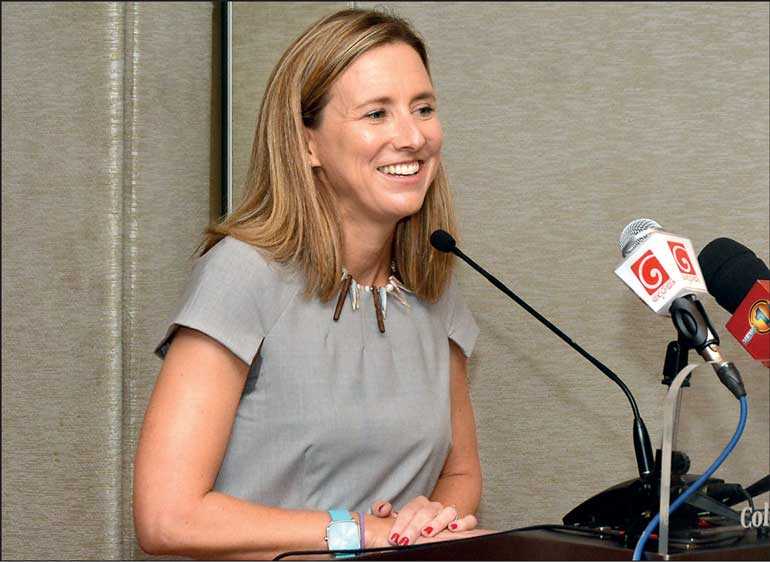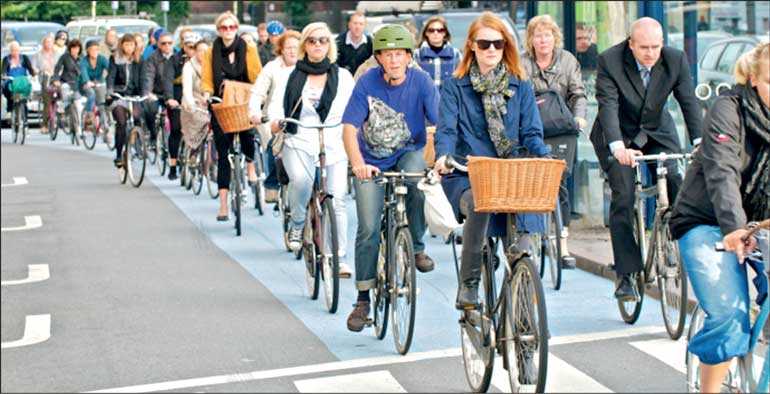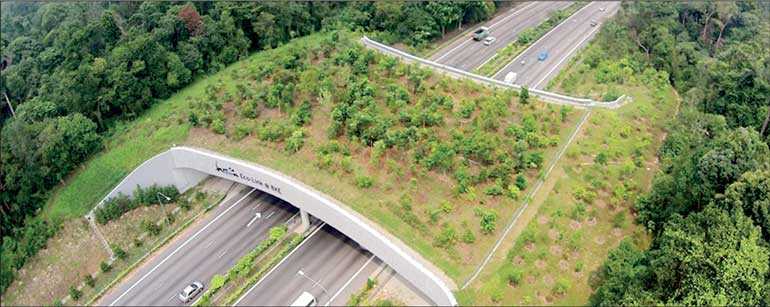Tuesday Feb 24, 2026
Tuesday Feb 24, 2026
Thursday, 14 November 2019 00:00 - - {{hitsCtrl.values.hits}}




A sum of $ 480 million is a lot of money. So when it is given as a grant to a middle-income country, naturally eyebrows will be raised. The Cabinet approved the MCC Compact for Sri Lanka on 29 October 2019. Yet there is still intense debate surrounding it, extending to fast unto death type protests. So how can Sri Lanka make the most of this grant?
What is the MCC?
MCC Resident Country Director in Sri Lanka, Jenner Edelman, explains: “MCC is an independent  development organisation similar to USAID. Its global mission is poverty reduction through economic growth. MCC has provided over $ 13 billion in 37 different compacts or grants since 2004 to nearly 30 countries worldwide. MCC doesn’t have many active partner countries at once, but all MCC grants are several million dollars in size. This is because MCC was created as an incentive program to recognise and reward countries that are good performers. Sri Lanka qualifies for such a large MCC grant for this reason - because it performs well against its peers in the lower middle-income category on 20 different transparent, third-party indicators of good governance, economic freedom and investing in people - a competitive selection process, which MCC uses annually to fairly and transparently select its partners.”
development organisation similar to USAID. Its global mission is poverty reduction through economic growth. MCC has provided over $ 13 billion in 37 different compacts or grants since 2004 to nearly 30 countries worldwide. MCC doesn’t have many active partner countries at once, but all MCC grants are several million dollars in size. This is because MCC was created as an incentive program to recognise and reward countries that are good performers. Sri Lanka qualifies for such a large MCC grant for this reason - because it performs well against its peers in the lower middle-income category on 20 different transparent, third-party indicators of good governance, economic freedom and investing in people - a competitive selection process, which MCC uses annually to fairly and transparently select its partners.”
Who does the MCC fund?
The selection criteria used by the MCC is comprehensive. It reminds me of the concept of human development where several aspects of wellbeing are considered in a country’s journey towards being a prosperous nation. The Human Development Index (HDI) is a composite index which takes into account a country’s income, health and education, not just its economic growth.
The MCC also selects eligible countries based on several indicators. The MCC forms partnerships with developing countries that are committed to good governance, economic freedom and investing in their citizens. For a country to be selected as eligible for an MCC assistance program, it must demonstrate a commitment to just and democratic governance, investment in its people and economic freedom as measured by different policy indicators. The MCC’s Board examines a country’s performance based on 20 independent and transparent policy indicators and selects countries based on policy performance.
When a country meets the MCC’s eligibility criteria, the country can present a project proposal to the MCC. A wide array of projects such as those addressing agriculture and irrigation, corruption, education, energy and power (generation, distribution and transmission), finance and enterprise development, health, land rights and access to land, transportation infrastructure (roads, bridges, ports), water supply and sanitation, etc. can be proposed.
The MCC’s Board of Directors found Sri Lanka to be eligible to develop a compact on 13 December 2016.
“The MCC scorecard, which covers 20 global indicators, is probably one of the very objective selection processes in the development world where only 30 countries have qualified for MCC grant assistance for the last 15 years. Really, it should have been a celebration in Sri Lanka rather than what is going on where the MCC has to defend its legacy and needs to address the absolute fake news and misinformation currently circulating. Perhaps this is a case study in itself as I wonder if any other donor project, after following due process, has got this much scrutiny in Sri Lanka,” added Edelman.
Other MCC grants
The MCC was created in January 2004 by the US Congress and has provided time-bound grants to nearly 30 countries across the world since its inception.
“In this region, Nepal has a $ 500 million MCC grant. GOI (Government of Indonesia) has completed a $ 600 million first compact and has requested and is developing a second one. The Philippines completed a $ 433 million grant a few years ago now,” stated Edelman.
The MCC Nepal Compact was signed on 14 September 2017 and will increase the availability of electricity and lower transportation costs, helping to spur investment, accelerate economic growth and reduce poverty.
The MCC Indonesia Compact entered into force on 2 April 2013 and ended on 2 April 2018. The compact included three projects. Through the Green Prosperity Project, the compact supported the Indonesian Government’s commitment to improve natural resource management and maximise opportunities for investment in renewable energy and sustainable agricultural practices, including through engaging and leveraging the private sector and other external resources.
The Nutrition Project aimed to prevent and reduce chronic malnutrition by improving the capacity of health service providers and strengthening community health, sanitation and educational efforts, ultimately helping to shape the national conversation on nutrition. The Procurement Modernisation Project piloted new procurement institutional and staffing arrangements and introduced a new digital system to help the Indonesian Government more efficiently and transparently procure goods and services.
In December 2018, the MCC’s Board of Directors found Indonesia eligible for a second compact.
The Philippine Government first had to implement a threshold program as the country did not meet the criteria in the Ruling Justly category, failing in the Control of Corruption indicator. The Philippine Government and USAID, which was responsible for implementing the program on the MCC’s behalf, signed the threshold program agreement in July 2006. The program concluded in May 2009. They were then eligible to apply for a five-year compact. This compact entered into force on 25 May 2011 and closed on 25 May 2016.
The MCC’s $ 434 million compact in the Philippines supported reforms and infrastructure in the country through three projects. First, the compact modernised the Bureau of Internal Revenue by redesigning and computerising business processes that increased the efficiency and sustainability of revenue collection. Second, the compact expanded and improved far-reaching community-driven development projects that strengthened community participation in development and governance activities at the village and municipal levels. Third, it rehabilitated a critical secondary national road on Samar Island that is reducing transportation costs for the island’s people.
What will the MCC grant fund in Sri Lanka?
On 20 September 2017, the Sri Lankan Government completed a study to identify the most binding constraints that prevent private sector-led growth in Sri Lanka. On 13 August 2018, the MCC delivered to the US Congress a congressional notification (CN) of its intent to negotiate an MCC compact with the Sri Lankan Government. On 25 April 2019, the MCC Board approved the five-year Sri Lanka compact.
It is important to note that once the MCC issues an Eligibility Notification, it is the respective country which proposes the projects. In the case of Sri Lanka, the compact seeks to assist the Government in addressing two of the country’s binding constraints to economic growth: inadequate transport logistics infrastructure and planning; and a lack of access to land for agriculture, the services sector and industrial investors.
“It’s important to note that the MCC is not buying or acquiring any land whatsoever under the compact’s land project. All activities – the digitisation of records through the e-Land Registry System, inventory and cadastral mapping of State lands across eight districts, populating the Government’s e-State Land Information Management System and scaling up Bim Saviya – were proposed by the Government. The MCC is simply supporting existing historically under-resourced Government of Sri Lanka initiatives and priorities,” explained Edelman.
The MCC will establish a Sri Lankan company to oversee the implementation of work. “Everything will be openly competed for. Globally, only 7% of our grant funds have gone to American companies. Local and other international companies are more competitive in most cases. We don’t give contracts to majority State-owned enterprises like some donors do. We have an explicit policy against this,” she added.
The way forward
It may seem that the country becoming eligible for the grant in 2016 was a good thing. The scorecard analysis which was conducted in November 2018 shows how the constitutional crisis would have impacted the MCC Sri Lanka scorecard from 2020 onwards; the ‘Ruling Justly’ indicator would have had the most immediate impact on Sri Lanka’s performance beyond 2019, possible making the country ineligible to receive the grant. However, even now the MCC might withdraw this grant support if the country does not soon make a decision. Or they may give a reasonably extended period to decide, given the imminent changes due through the Presidential Election.
The President would have signed the compact if it was not for the 51-day constitutional crisis at the end of 2018. Then from January 2019 onwards, the Opposition started criticising the MCC Compact as something that was detrimental to the country. Could this have been to prevent the Government in power from getting credit for obtaining a large grant? Would the Opposition sign it if they come to power? Perhaps. It is not unusual for politicians to try and take credit, as well as benefits, from development investments made in a country.
Part of the confusion seems to be regarding economic corridors and other agreements such as the Status of Forces Agreement (SOFA) and the Acquisition and Cross-Servicing Agreement (ACSA). The MCC looks at improving road corridors, which is something different and unconnected to the Colombo-Trincomalee Economic Corridor. Edelman stated that the MCC grant had no connection to other agreements such as ACSA and SOFA.
Should we stop a Government from building roads for farmers to transport their goods to the market and children to get to school? I believe any citizen would say no. It is apparent that many sectors in Sri Lanka could directly or indirectly benefit from the MCC grant. The inflow of technology through the MCC grant should also be of special interest. New opportunities created for local businesses, services and industries should also be kept in mind.
These investments not only support stability and prosperity in partner countries but also enhance donor interests. The Sri Lankan Government should spearhead a process involving civil society, academics, experts and interest groups to define projects to deliver quality outputs, which will have sustainable outcomes that foster human development and wellbeing for all Sri Lankans.
For example, how do we create or is there room for infrastructure that allows bicycle paths, bio bridges or eco-links (to prevent the human-elephant conflict for example) and inclusive infrastructure (sidewalks accessible by wheelchairs) in the road network? How can we ensure that public transport is inclusive (i.e. low floor and disabled-friendly) and bus drivers have quality of life?
Therefore, it is important to have independent institutions speak, based on objective research and publications, and for policymakers and people to make evidence-based decisions, rather than for political agendas to take precedence in current decision-making.
“There seems to be a lot of mistrust and misinformation surrounding the MCC in Sri Lanka. For example, no physical land records will be destroyed as alleged. Once the country became eligible, it is Sri Lanka who submitted proposals to request for the $ 480 million. This is the first time a country has not signed the agreement once the grant has been approved. Other countries, including those in the region, have used MCC grants to implement and complete projects in their countries. Some countries have even requested a follow-up grant,” Edelman emphasised.
One could argue that this is a rare opportunity as grants to Sri Lanka have decreased due to the country graduating to middle-income status. Personally, I believe a more non-emotional, evidence-based approach needs to be taken by Sri Lanka. The MCC is a good investment for the American people (grants are from taxpayers’ money), since it offers cost-effective projects, a lean staff and an evidence-based approach. It is up to the Sri Lankan people to engage and define it to benefit the country, without rejecting it outright.
Perhaps Sri Lanka should successfully implement the first compact and request a second one (contingent on eligibility), which addresses more sustainable areas such as renewable energy.
Now 61 years after our nation gained its freedom, Sri Lankans should be working together, rather than against each other. Let’s make things work rather than tripping the person in front of us. Let’s create a country which has opportunities and choices for everybody, where each citizen can pursue his or her dreams.
(The writer is a consultant for sustainable human development and innovation and can be reached at [email protected])
[This article is based on information available in the public domain (https://www.mcc.gov/), a meeting with the Millennium Challenge Corporation Resident Country Director for Sri Lanka, Jenner Edelman, and subsequent information provided by her office]